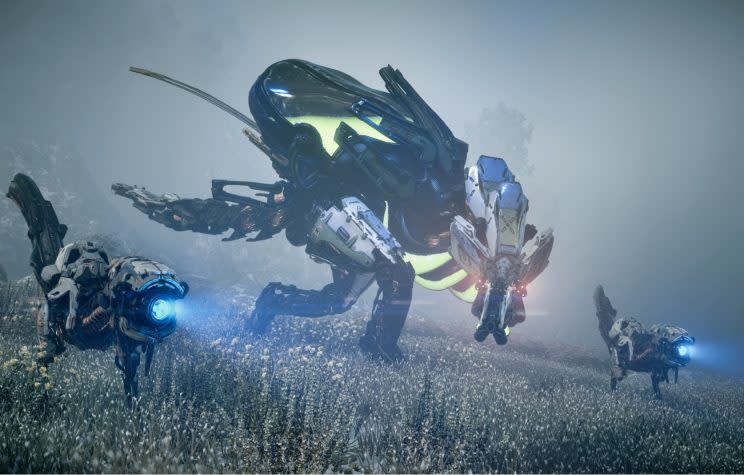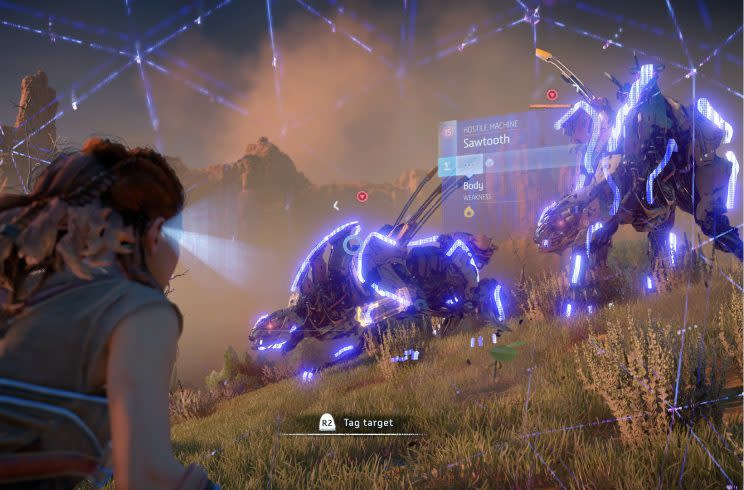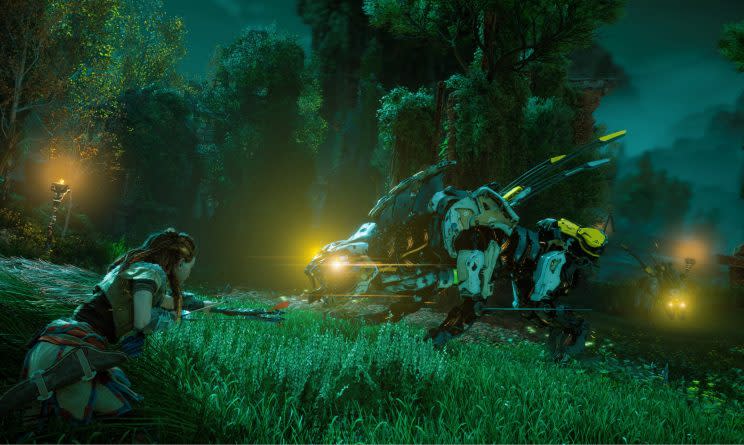'Horizon: Zero Dawn' Review: Combat and storytelling shine in spectacular sci-fi epic

Zombies might be trendy, but when it comes to all-ages geek reliability, you’d be hard pressed to beat out dinosaurs and robots — an unofficial poll of my toddler’s pre-school class confirms this.
So it goes, then, that a game featuring robotic dinosaurs would be off to a pretty good start. Indeed, Sony and developer Guerilla Games couldn’t have fared much better in the run-up to the release of the Sony (SNE) PS4 exclusive, “Horizon: Zero Dawn.” A darling at trade shows like E3 and Gamescom, ”Horizon’s” dirt-meets-metal, futuristic take on prehistory managed to capture the imagination of even stodgy gamers. And considering how many fantastical worlds we have conquered and beasts we have slain, that’s not easy.
But “Horizon” doesn’t just score points for its mechanized monsters. This is an open-world epic that borrows from the past in the best ways possible: a smidgen of “Shadow of Mordor,” a dash of “Far Cry,” a teaspoon of “Assassin’s Creed,” a shot of “Tomb Raider,” maybe a whiff of “The Witcher,” all jammed together and wrapped in a setting literally centuries ahead of the rote sci-fi hooey most games foist off as a plot. Derivative? A little, but within minutes “Horizon” makes you forget about its inspirations and dive headfirst into its fresh — and flat-out fun — future.
Extinction event
“Horizon” is pleasantly set many years past the boring blast zone of most post-apocalyptic games. In the far future, dinosaur-like machines roam the earth, living in relative harmony with tribes of hunting and gathering humans. You’re Aloy, a motherless outcast of the spiritual Nora tribe. Raised by her adoptive father, Aloy stumbles upon a wearable earpiece buried in an underground bunker from the age of the Old Ones (us, or thereabouts). Called a “Focus,” the device effectively slaps a layer of AR over the real-world.
The machines, as it turns out, are starting to get a little bitey (and shooty), a fact that dovetails into an attack by a rival tribe. Aloy thus leaves the nest to track down these enemies, explore the world and ultimately discover the secrets of both her enigmatic past and the strange world itself. And, naturally, kill things to save things.

Though “Horizon’s” distant future tribalism gives off a “Cloud Atlas” vibe, it isn’t a vague sketch. The developers go to great lengths to root every inch of their world in lore; every rusted, half-buried chunk of metal and dilapidated structure is there for a reason. The story is a slow burn, revealing only hints of What The Hell Happened for the bulk of its 40-hour run, and it’s better for it. I was drawn back to the main plot not out of duty but genuine interest. For fear of spoiling anything I won’t get into the details; suffice to say, Aloy’s journey touches on all sorts of contemporary techno-political issues. This is a sci-fi tale any genre fan can get behind.
Her rise from outcast to hero, while unremarkable on paper, is surprisingly effective, too, thanks again to how deftly the developers weave plot points into her development. Ashly Burch’s excellent voicework gives Aloy, an interesting character from the outset, marvelous emotional depth. The rest of the cast can’t quite keep up — many of the voices and characters are forgettable — but Aloy is strong enough to carry the entire story.
Robots in disguise
Horizon’s great narrative is supported by what’s become a pretty standard open-world loop of floating back and forth between the game’s startling vistas and a huge overworld map littered with things to do, baubles to collect and fogged terrain to uncover. It’s here where the game’s Ubisoft (UEN.F) inspirations are most apparent: locating and scaling giraffe-like Tallnecks to uncover more of the map is straight out of “Assassin’s Creed,” while its resource gathering/item crafting system (need a bigger quiver? Go shoot some boars!) largely mimics “Far Cry,” even including little icons denoting machine spawn sites.

I was initially put off by the similarities, but those machines give it a unique twist. Modeled after real-world animals both current and prehistoric, the robots present a constant threat. If you were intimidated by, say, panthers in “Far Cry,” just wait until you meet your first Stalker, a super-sized robo-cheetah with stealth camo and sniper lasers. Docile robotic grazers can quickly turn deadly; the bigger, nastier beasts like the crocodilian Snapmaw often come in packs and will send a shiver down your spine even when you’ve leveled up a bit. Discovering a new machine is always thrilling, as is figuring out how the hell to take it down.
The thrill of the hunt
That’s a credit to “Horizon’s” excellent combat. Aloy primarily wields a variety of bows capable of firing powerful elemental arrows, but she also uses slings, ropes, and even a gun that shoots tripwires to drag the beasts to the ground. Each machine has strengths and weaknesses, helpfully highlighted when viewed through your Focus and catalogued in a crucial database that gives tips on how to best defeat these things.

You can, for instance, try picking off the metal plates shielding the heart of a monstrous Thunderjaw (a T-Rex by way of DARPA) to reveal its soft spot, or you might prefer to forcibly remove the beast’s back-mounted disc launcher and use it as a weapon. Aloy also can learn how to “override” machines, which will temporarily bring them to her side to wreak havoc in combat. Ammo can be crafted on the fly, so you’ll never really need to leave combat to fiddle with settings. The result is action that is simultaneously immediate and strategic, and thanks to good controls and crunchy feedback, extremely rewarding.
Aloy’s devastating ranged weaponry, however, belies her underdeveloped melee attacks. Considering how quickly machines can close the gap to chew on your face, you’d expect more than one quick and one heavy attack with Aloy’s trusty spear. But that’s about it. Even late in the game, you’ll be hammering on your trusty dodge-roll, tossing in a few good whacks, and then looking to back out and shoot again. The melee upgrade path is pretty meager, and the surprising lack of an enemy lock-on leads to occasionally frustrating swings and misses.
Horizon makes up for it with potent stealth mechanics that, initially at least, help you deal with otherwise out of your league enemies. Hiding in tall grass to sneak up and take down a Raptor-like Watcher is satisfying. But it’s just as underdeveloped as the melee combat, with no snap-to-cover system to gain protection from projectiles.

The game’s tame skill system also lacks pizazz. Only a few upgrades, like the ‘Tinker’ ability that lets you reassign modifications or the ability to ride certain robots as mounts, fundamentally impact the game. The best path to a better Aloy is to just get better at the game.
Not that this is a problem, because “Horizon’s” smooth learning curve ensures you’re never totally out of a fight. It’s a challenging game, to be sure, but the battles are more breathtaking than thumb-breaking. It’s beautifully balanced, reminiscent of the superb “Shadow of Mordor.”
It looks beautiful, too. Despite its post-apocalyptic status, Horizon’s world is lush and dynamic. Green fields give way to arid deserts. Climb foothills and you’ll touch frigid, snowy mountaintops. Each region organically flows into the next, a seamless, grounded open-world. This is most definitely a screenshot game. Unfortunately, Horizon struggles a bit when things get more personal. Aloy and other characters look fine, but the lip synch during cut-scenes is often wonky, effectively torpedoing dramatic moments. This isn’t “Uncharted 4.”
And while your mind will invariably float to other games, “Horizon” quickly recaptures it. A few hours in, the bulk of its open-world still shrouded in secrecy, it hit me that the game isn’t trying to re-invent the wheel so much as remind us how cool wheels are in the first place. It successfully marries open-world shenanigans with a great story, a “Witcher”-sized challenge, and keeps it humming with smart, addictive combat against a tide of brilliant enemies. Our species might lack good judgment from time to time, but “Horizon” proves we’re still worth saving.

What’s hot: Terrific story, engaging until the very end; magnificent robotic dino-beasts; intense, heady action; captivating world
What’s not: Weak melee; skill tree relatively small; at times a little too derivative